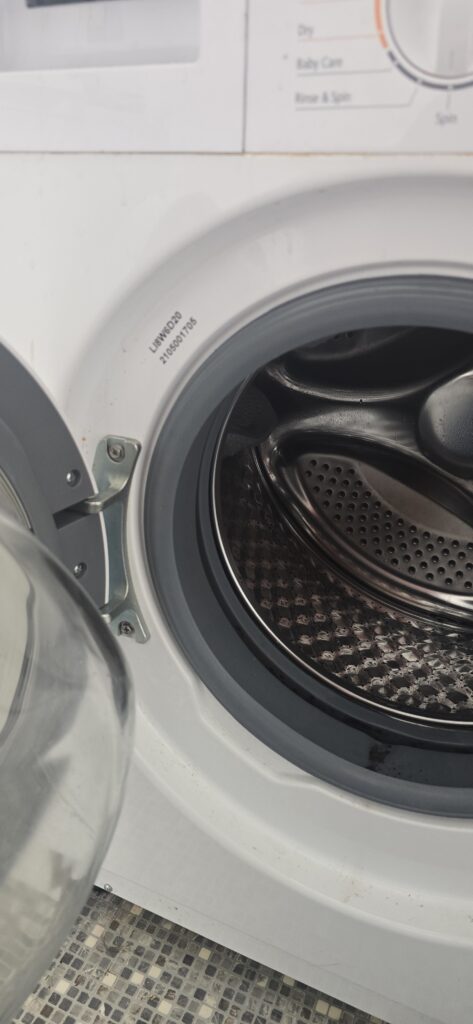
How to Tell if Washing Machine Bearings Have Gone Bad
If your washing machine has become noisier than usual, is leaking water, or the drum feels loose, the bearings may be failing. Washing machine bearings support the drum’s rotation, ensuring smooth and quiet operation. When they wear out, they can cause major damage if left unchecked.
What Are Washing Machine Bearings?
Bearings are small but essential components that help the drum spin freely. They are located at the back of the drum and are responsible for reducing friction during the wash cycle. Over time, they can wear out due to water exposure, rust, or general wear and tear.
Signs That Your Washing Machine Bearings Are Worn Out
Here are the most common symptoms of failing bearings in a washing machine:
1. Loud Noises During the Spin Cycle
A common sign of worn-out bearings is a loud rumbling, grinding, or knocking sound when the washing machine spins. The noise is caused by the bearings losing their smoothness, leading to friction and vibration.
2. Excessive Drum Movement
If the drum feels loose when you push it up and down by hand, it’s likely that the bearings are worn. A properly functioning drum should have minimal movement.
3. Water Leaks Around the Drum
Damaged bearings can cause the drum seal to break down, allowing water to leak from the washing machine. If you notice water pooling underneath your machine, worn bearings could be the cause.
4. Uneven or Wobbly Drum
If the drum wobbles excessively when spinning, it suggests the bearings are no longer holding the drum securely in place.
5. Burning Smell or Overheating
Severely worn bearings can cause excessive friction, leading to a burning smell or overheating of the motor.
How to Check if Your Washing Machine Bearings Are Faulty
Follow these simple tests to confirm if your drum bearings are failing:
- Spin the Drum Manually: Open the door and spin the drum by hand. If it makes a rough, grinding noise, the bearings may be worn out.
- Move the Drum Up and Down: Push the drum up and down inside the machine. If there is excessive movement, the bearings are likely damaged.
- Check for Leaks: Look for water leaking from the back of the drum, which can indicate bearing seal failure.
Can You Still Use a Washing Machine with Worn Bearings?
Technically, yes—but it’s not recommended. Running a washing machine with faulty bearings can cause:
- Increased noise levels, making the machine disruptive.
- Further damage to the drum and other internal components.
- Water leaks that may cause electrical hazards or flooring damage.
- Complete failure of the washing machine, leading to costly repairs or replacement.
How to Prevent Washing Machine Bearing Failure
To extend the lifespan of your drum bearings, follow these maintenance tips:
- Avoid Overloading: Excessive weight puts extra strain on the bearings.
- Ensure Level Installation: A washing machine that isn’t level can cause premature wear.
- Check and Replace Seals: Worn seals can allow water to seep into the drum, causing rust.
- Perform Regular Inspections: Periodically check for leaks, drum movement, and unusual noises.
Should You Repair or Replace the Bearings?
In many cases, drum bearings can be replaced rather than replacing the entire appliance. However, the difficulty and cost of replacement depend on your machine type:
- Some washing machines have sealed drums, meaning the bearings cannot be replaced separately. In this case, you may need to replace the entire drum assembly or the machine itself.
- For machines with replaceable bearings, the cost of parts is generally affordable, but the repair process can be labor-intensive.
Washing Machine Bearing Repair in Weymouth, Portland & Dorchester
If your washing machine is making loud noises, leaking, or showing excessive drum movement, the bearings may need professional attention. We provide expert washing machine repair services in Weymouth, Portland, Dorchester, and surrounding Dorset areas.
For more information on washing machine maintenance, check out Which? washing machine reviews and BBC Good Food’s appliance care guide.
Our experienced engineers can diagnose bearing issues quickly and perform professional repairs at competitive prices. Don’t ignore the warning signs—contact us today for reliable washing machine repair service.
📞 01305 551551
Domestic Appliance Repair Ltd
Serving Weymouth, Portland & Dorchester




